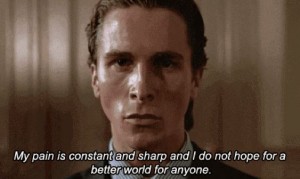In Ecclesiastes 4:1-8, Solomon elaborates on how we often relate to other in inappropriate ways. The first three verses talk about how powerful people often oppress the poor. In a world in which we are alienated from an uncaring  universe this is especially sorrowful. To witness this makes Solomon despair of humanity and says that it’s better to have never been born than to witness such abuse. People are not objects to be used for my pleasure, privilege or position. Solomon says that the oppressed had no one to comfort them and that the oppressor had no one to comfort them. You don’t always think of the two being in the same boat. Hitler’s minister of supply, Albert Speer, was the productive genius behind the mobilization of German industry. He said in his book “Inside the Third Reich,” “Hitler could fascinate, but he could not respond to friendship. He repelled it. The normal sympathies that normal men and women enjoy were just not in him. At the core of the place where his heart should be, Hitler was a hollow man. He was empty. We who thought we were close to him, all came to see this. He thought that power could comfort him. It didn’t. He was more miserable than the Jews in Auschwitz.”
universe this is especially sorrowful. To witness this makes Solomon despair of humanity and says that it’s better to have never been born than to witness such abuse. People are not objects to be used for my pleasure, privilege or position. Solomon says that the oppressed had no one to comfort them and that the oppressor had no one to comfort them. You don’t always think of the two being in the same boat. Hitler’s minister of supply, Albert Speer, was the productive genius behind the mobilization of German industry. He said in his book “Inside the Third Reich,” “Hitler could fascinate, but he could not respond to friendship. He repelled it. The normal sympathies that normal men and women enjoy were just not in him. At the core of the place where his heart should be, Hitler was a hollow man. He was empty. We who thought we were close to him, all came to see this. He thought that power could comfort him. It didn’t. He was more miserable than the Jews in Auschwitz.”
In verses 1-3, others are viewed as objects, in verses 4-6, Solomon addresses the fact that we often treat each other as simply rivals, clawing after the same scraps of meat. He says that even “a man’s skill in his work comes from his envy of his neighbor.” His conclusion is the same as always; it’s vanity of vanity and is striving after the wind! We focus all our energy on getting ahead and miss the glory of creation especially as seen in the people around us. On his journey to the Celestial city, Pilgrim, in “Pilgrim’s Progress,” encounters a man “who looked no way but downward.” He ignored Christian because he was too busy groveling on his knees in dirt and filth, working constantly with a rake, trying to unearth some choice jewel that would enrich his life. Bunyon writes, “Over his head was one offering him a celestial crown for his muck rake; but he man never looked up.” He missed the best things in life.
Not only do we often treat others as objects or rivals, Solomon observes in verses 7-8 that we often just view them as unnecessary. I don’t need anyone! “I’m safe within my room, hiding in my room, I touch no one and no one touches me. I am a rock. I am an island, and a rock feels no pain and an island never cries.” C. S. Lewis wrote, “to love at all is to be vulnerable. Love anything and your heart will certainly be wrung and possibly broken. If you want to make sure of keeping it intact, you must give your heart to no one or nothing. Wrap it carefully round with hobbies and little luxuries; avoid all entanglements; lock it up safe in the casket of your selfishness. But in that casket – safe, dark, motionless, airless, it will change! It will not be broken; it will become unbreakable, impenetrable, and irredeemable. The only place where you can be perfectly safe from all the dangers of love is Hell.”